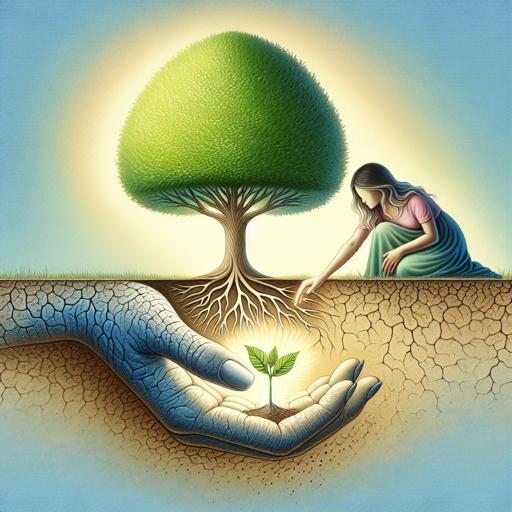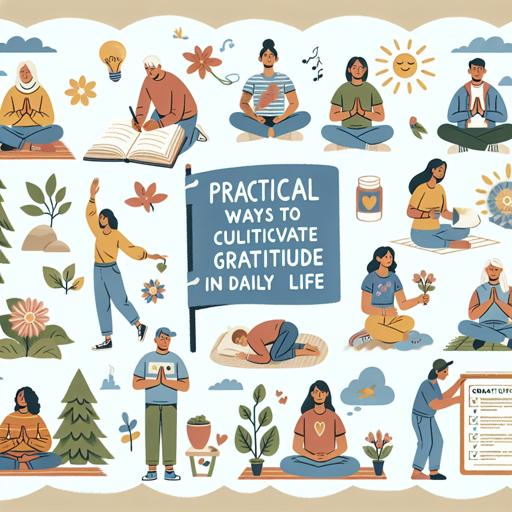In today’s fast-paced world, fostering an attitude of gratitude can be a transformative practice that enhances well-being and enriches daily life. Gratitude is more than just a fleeting feeling; it is a powerful mindset that can shift perspectives and improve mental health. By consciously acknowledging and appreciating the positive aspects of our lives, we can cultivate a sense of contentment and resilience.
This blog will explore the profound impact of gratitude, offering insights and practical tips on how to integrate this life-changing attitude into your everyday routine, ultimately leading to a more fulfilling and joyful existence.
Understanding the concept of gratitude: a foundation for personal growth

Embarking on the journey of personal growth might seem reminiscent of assembling a complex jigsaw puzzle, where the missing piece is often an inclination to embrace gratitude. Straddling the line between humility and abundance, nurturing a grateful mindset acts as a catalyst for transformative change. Through this evolutionary process, individuals learn not only to acknowledge their accomplishments and opportunities but also to harness them towards a productive and enriched life.
The concept of gratitude goes beyond the simplistic notion of saying „thank you;” it is a profound shift in perception that requires recognizing the intrinsic value of experiences and encounters, no matter how mild or profound they may seem on the surface. The art of cultivating a grateful heart involves navigating through life’s ups and downs, viewing each instance as integral to one’s growth rather than as mere happenstance.
Imagine gratitude as a lens through which the world is transformed—a tool that highlights the positive aspects in situations often clouded by negativity or indifference. Picture a professional who, amidst a challenging work environment, decides to focus on the learning opportunities rather than the obstacles.
By intentionally expressing appreciation, even in the face of adversity, they foster an internal environment where resilience flourishes. This deliberate act of focusing on the positive aspects serves to elevate one’s experience to a space of personal empowerment and genuine contentment. Navigating through life with a grateful mindset is akin to discovering a wellspring of unexpected fortune, a strategy that invites goodwill and abundance.
This practice leads to an increased awareness of one’s surroundings and a deeper connection with the present moment. By integrating gratitude into daily life, individuals uncover layers of personal potential and unlock pathways to profound personal achievements.
As one sails through the seas of life, buoyed by gratitude, the tides of change transform from threatening waves to opportunities for growth, one acknowledgment at a time. Through this journey of appreciation, one discovers that fostering a nurturing and thankful disposition is not merely beneficial but absolutely essential for a fulfilling and expansive life journey.
The psychological and physical benefits of practicing gratitude

In a world teeming with distractions and demands, nurturing an attitude of gratitude might sound like the gentle whisper in a cacophony, but its power to transform is far more profound than its subtlety suggests. Engaging in this intentional practice doesn’t just sprinkle rays of perpetual sunshine on one’s proverbial grey skies; it carves out space for genuine happiness and overall well-being.
With a steady focus on acknowledging what one has rather than lamenting what one lacks, gratitude becomes a compass guiding individuals toward deeper psychological resilience and fulfillment. From a psychological standpoint, regular reflection on the positives enhances emotional regulation and boosts feelings of self-worth, warding off the insidious tendrils of anxiety and depression. It acts as a bridge to better relationships, encouraging empathy and reducing the frequency of toxic emotions such as resentment and envy.
By regularly appreciating life’s gifts, large or small, individuals communicate an unspoken „thank you” into the world, which almost invariably bounces back, fortifying an optimistic outlook that becomes a protective shield against life’s inevitable challenges. Physically, gratitude does much more than just warm the heart; it gently nudges vital bodily mechanisms toward harmony.
Studies have shown that those who cultivate a grateful mindset experience improved sleep patterns, alongside reductions in the physical markers of stress. Blood pressure levels tend to normalize, opening avenues for a longer and healthier life. Gratitude encourages healthier lifestyles, motivating people to participate in regular exercise and maintain balanced diets, subtly knitting a fabric of positive choices that support overall health.
It thus becomes clear that gratitude acts as a silent benefactor, refining the delicate dance between mind and body, with each step bringing an array of benefits impossible to overlook. In essence, fostering this indispensable attitude is like planting seeds of joy and well-being within the self, bound to blossom over time into a life richer, fuller, and more uniquely attuned to the rhythm of contentment.
Practical ways to cultivate gratitude in daily life

In a world that often seems to applaud the relentless pursuit of more, the cultivation of thankfulness can feel like a serene rebellion against the status quo. Embracing an attitude that appreciates life’s present riches is not merely about creating a fleeting ambience of positivity. It is about transforming one’s mindset to savor the abundance that already exists in every moment.
To gently transition from yearning for what we lack to relishing what we have, one need not make drastic changes but simply incorporate small, intentional practices into daily routines. Picture starting your morning by mentally itemizing three things for which you are genuinely appreciative.
This could be as grand as your career achievements or as minimal as the first sip of coffee in silence. This uncomplicated mindfulness exercise doesn’t only set a positive tone for the day but also trains your brain to focus on the good amid life’s chaos. Carving out time in your day to pen down these grateful thoughts can further solidify this thoughtful habit.
Having a gratitude journal invites moments of reflection, transforming fleeting feelings into tangible affirmations. As the ink bleeds onto paper, take a moment to appreciate the little things—a colleague’s joke that lifted your spirits during a tedious meeting or the soft, comforting weight of your pet curling up beside you.
You will find that regularly practicing this art of noticing inherently rewires your internal narrative, steering it away from complaints and comparisons toward an enriching acknowledgment of prosperity both grand and minute. Additionally, sharing this cultivated appreciation with others amplifies its impact.
Expressing gratitude through words or deeds doesn’t only boost your well-being; it creates a ripple effect that influences those around you. By recognizing and expressing thanks to someone for their kindness or support, you invite an atmosphere of shared positivity, reinforcing bonds and enhancing interactions. This mutual reinforcement of thankfulness is indeed a gift that keeps on giving, gradually fostering an environment where appreciation is not only nurtured but becomes a second nature, fundamentally transforming the lens through which you perceive the world.
Thus, welcome the challenge of fostering this attitude, and watch as gratitude unearths hidden gems within the ordinary tapestry of day-to-day life.
Overcoming challenges and obstacles in developing a grateful mindset
Developing a genuinely optimistic outlook, especially in today’s fast-paced and often challenging world, can feel akin to climbing a mountain without any gear. However, nurturing a sense of gratitude is akin to finding the perfect hiking boots that make the trek not only manageable but genuinely enjoyable.
The journey towards fostering an attitude of appreciation begins with acknowledging the inherent challenges involved. Daily life is filled with stressors and distractions that can easily blind us to the simple yet profound joys in our surroundings. Whether it’s the pressure of meeting deadlines at work or the constant juggling of personal responsibilities, these obstacles all too often act like blinders, obscuring our ability to see the beauty and kindness that permeate our reality.
Despite these hurdles, instilling an appreciative mindset is a transformative endeavor. Implementing small yet effective practices can lead to significant shifts in how we perceive and interact with the world.
For instance, making a conscious effort to recognize and savor simple pleasures—like a morning cup of coffee that’s brewed just right or an unexpected smile from a stranger—can gradually rewire our brains to prioritize positivity over pessimism. Journaling about daily highlights or sharing moments of kindness with loved ones at dinner can also serve as powerful tools in this recalibration. It’s through these deliberate acts of acknowledging life’s many gifts that the seeds of a grateful psyche begin to take root, ultimately leading to a richer, more fulfilling existence.
As with any worthwhile pursuit, the rewards far outweigh the initial efforts, transforming obstacles into mere stepping stones on the path to a life filled with gratitude and joy.
The impact of gratitude on relationships and community building
Picture, if you will, a world where appreciation is as common as coffee shops on a city street corner—a society where thankfulness isn’t reserved for sporadic Hallmark holidays but is a daily practice that fosters deeper connections and lays the foundation for vibrant, resilient communities. An attitude of gratitude, often undervalued in its ability to nurture bonds, indeed weaves the very tapestry of social harmony. This isn’t merely a warm and fuzzy sentiment but a pillar of emotional robustness and interpersonal growth.
When individuals consistently acknowledge and appreciate the positive aspects of their lives and the efforts of others, barriers of misunderstanding and negativity tend to dissipate like fog in the morning sun. In the realm of personal relationships, expressing gratitude acts as a powerful emotional currency.
Consider a partner who regularly acknowledges the silent contributions in a relationship—be it cooking a meal, fixing a shelf, or simply being present. This recognition not only promotes positive feelings but cultivates an environment where both partners feel valued and encouraged to reciprocate. Effectively, gratitude becomes the silent architect of love, knitting together the intricate patterns of connection with threads of understanding and affection.
It creates a feedback loop of positivity that reinforces mutual respect and consideration, enhancing the quality and stability of the relationship. Extending gratitude to the community level, the dynamic of appreciation works much like celebrating small victories in a sports team; it unites and motivates.
In a neighborhood or social group, when gratitude is extended towards individuals who voluntarily lend their time or resources, it not only gratifies but galvanizes greater community involvement. Imagine neighbors coming together, motivated by appreciation expressed through community shout-outs, thank-you walls, or appreciation events.
These practices build communal resilience, as participants feel a kinship bolstered by the shared recognition of their contributions. The result is a more cohesive society where the virtues of kindness and collaboration overshadow the specters of division and apathy, creating a thriving ecosystem of mutual support and shared progress.
Nasza rekomendacja wideo
Podsumowanie
Cultivating an attitude of gratitude can transform your life by enhancing mental well-being, strengthening relationships, and increasing resilience. By consciously appreciating the positive aspects of life, you invite more joy and contentment.
Simple practices like keeping a gratitude journal or expressing thanks to others can make a significant difference, fostering a more positive outlook and enriching your daily experiences.
Najczęściej zadawane pytania
How can practicing gratitude improve mental health and overall well-being?
Practicing gratitude can improve mental health and overall well-being by fostering positive emotions, enhancing life satisfaction, and reducing stress and depression.
What are some effective daily habits to cultivate a mindset of gratitude?
Effective daily habits to cultivate a mindset of gratitude include keeping a gratitude journal, practicing mindfulness or meditation, expressing appreciation to others, and reflecting on positive experiences each day.
How does expressing gratitude impact relationships and social connections?
Expressing gratitude strengthens relationships and social connections by fostering positive emotions, enhancing mutual trust, and encouraging reciprocal kindness.
What role does gratitude play in overcoming challenges and adversity?
Gratitude helps reframe challenges by fostering a positive mindset, enhancing resilience, and promoting emotional well-being, which can make overcoming adversity more manageable.
How can parents and educators teach children the importance of gratitude?
Parents and educators can teach children the importance of gratitude by modeling grateful behavior themselves, encouraging regular reflection on things they are thankful for, and incorporating gratitude practices into daily routines.
What are some creative ways to incorporate gratitude into a busy lifestyle?
Incorporate gratitude into a busy lifestyle by setting a daily reminder to jot down three things you’re thankful for, using commute time to mentally list positive experiences, or expressing appreciation through quick texts or notes to loved ones.
